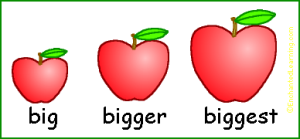Adjectives – Part B
Using adjectives can be confusing. There are many exceptions to the rules of adjective-using. I will try and simplify things for those in need of guidance.
Adjectives are used to describe or modify a noun (i.e. place, person, thing, or idea). Examples:
- A unique blend
- The fastest runner
- An amazing trilogy
- Six months’ severance pay

Adjectives!
An adjective is usually placed before the noun which it is modifying. However, there are always exceptions to the rule, and these will be discussed later.
Using too many adjectives can render a paragraph effectively unreadable and overstated. There is such a thing as too much of a good thing. Even though adjectives can bring your writing up a peg, it is advised to use them with caution. If someone is the most beautiful person you have ever seen, don’t write it – show it!
Adjectives Should Be Used Sporadically
This is not to say that adjectives are bad. A well-placed adjective can add a lot to a sentence, and drive home a point. But adjectives are best used sporadically and not consecutively, in order to maximize readability and effect
Adjectives have different degrees in them. These are commonly referred to as the positive, the comparative, and the superlative. Examples:
Marlon is a nosy person, his mother Cheryl is even nosier, and his father Craig is nosiest of the whole bunch
Nosy (positive), nosier (comparative), nosiest (superlative)
Bridget is a stupid girl, but her friend Kim is stupider, and their friend Beverly is the stupidest girl in all of Scotland.
Stupid (positive), stupider (comparative), stupidest (superlative)
Notice that when a word ends in a y (nosy), the suffix gets an additional i. Instead of –er, the suffix becomes –ier. Instead of –est, the suffix becomes –iest.
Happy – happier, happiest
Lucky – luckier, luckiest
Examples of exceptions to the rule:
Good-better-best
I am a good student, my brother is a better student, and my father was the best student our school had ever seen.
Far-further-furthest
I can throw a football pretty far, my cousin can throw it even further, and my neighbor throws it the furthest.

Some adjectives, such as the word unique, have a certain measure of comparison in them. In the case of unique, it is not possible to say something is uniquer, or uniquest. Something is either unique or it is not. One may argue that you can use the combination more unique, less unique, or most unique, but even those are not completely accurate, and are best avoided.
Proper use of suffix is important. The suffix –er, and –est, are used with certain words. No-one says that something is the most heaviest thing they have carried. It is, however, possible to heighten degrees of intensity. Example:
The mild weather is much better than stormy weather
Correct use of adjectives and pre-/post-modifiers is something that comes with practice. Soon enough, you will be able to hear the right from the wrong, and make smart decisions about using adjectives.
No comments yet.